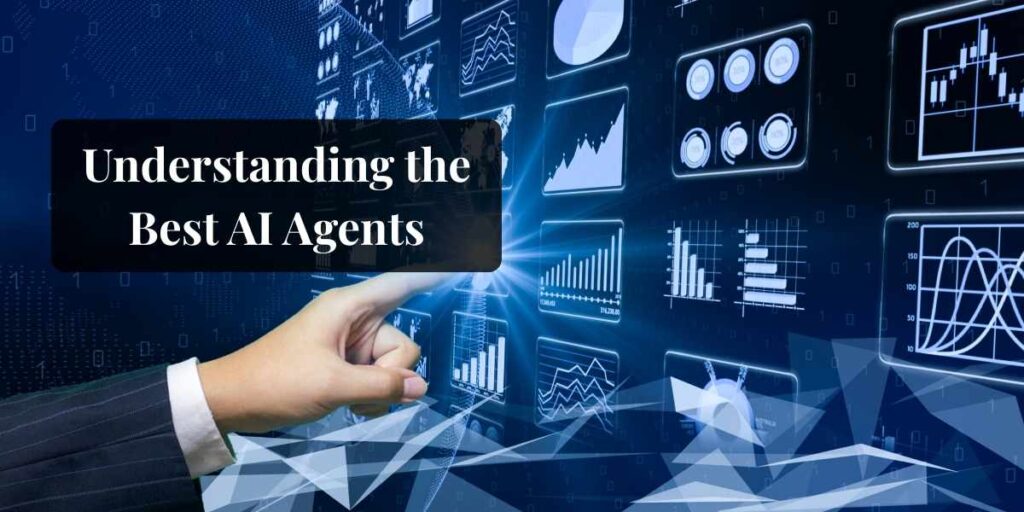In today’s fast-paced digital world, intelligent agents are emerging as powerful tools that can analyze situations, make choices, and take actions to accomplish specific objectives. These systems are being used to simplify complex business processes, improve customer experiences, and even support individuals in managing daily tasks more efficiently. They go far beyond simple automated programs or chat-based assistants; instead, they represent a major step toward independent systems that can handle multi-layered processes with very little human guidance. What sets them apart is their ability to learn, adapt, and act proactively, often anticipating what is needed before being instructed. As both organizations and individuals continue to pursue greater productivity and smarter automation, Understanding the Best AI Agents has become increasingly important for staying ahead in a technology-driven era.
Top 10 Best AI Agents
The landscape of intelligent agents is continuously evolving, with fresh advancements reshaping the possibilities almost every day. Below is a curated list of some of the leading AI agents and frameworks for creating these agents that have stood out in 2024-2025. These technologies deliver a wide range of capabilities, catering to different industries and use cases—from automation and data analysis to customer interaction and decision support. Whether for businesses aiming to optimize operations or developers looking to build smart applications, these solutions represent the cutting edge in intelligent agent technology today.
| Rank | AI Agent/Platform | Primary Function | Key Highlight |
| 1 | ChatGPT (OpenAI) | Conversational AI, content generation, coding assistance, research | Most popular general-purpose AI application, highly versatile. |
| 2 | Microsoft Copilot | Productivity enhancement, task automation across Microsoft 365 apps | Deep integration with MS Office suite and Windows. |
| 3 | Claude (Anthropic) | Secure and reliable conversational AI, content generation, summarization | Focus on ethical AI and robust enterprise capabilities. |
| 4 | AgentGPT | Autonomous AI agent creation and deployment | Enables users to define goals for autonomous AI agents. |
| 5 | CrewAI | Multi-agent collaboration framework for complex workflows | Open-source, code-based, focuses on role-based agent teams. |
| 6 | Intercom AI (Fin) | Customer service, frontline support, ticket optimization | Human-level support using company knowledge base. |
| 7 | Fellow | Meeting transcription, summarization, action item assignment | Automates meeting processes, integrates with calendars. |
| 8 | HubSpot Breeze | Sales prospecting, email outreach, lead nurturing | Identifies prospects, automates personalized outreach. |
| 9 | Glean | Enterprise search, knowledge management, custom AI app building | Centralizes company knowledge, builds generative AI apps. |
| 10 | Hightouch AI Decisioning | Marketing workflow automation, personalized messaging, ad optimization | Uses machine learning for optimal customer engagement. |
Note: This list includes a mix of well-known foundational models with agentic capabilities, agent-building frameworks, and specialized AI agents that demonstrate advanced functionalities in specific domains.
Also Read – Personal AI Agents
Types of Agents in AI
AI agents can be classified according to their intelligence, how they perceive their environment, and the complexity of the decisions they are capable of making. Grasping these different categories is essential for recognizing just how diverse and intricate these systems can be. From simple reactive agents that respond directly to stimuli, to more advanced learning agents that adapt and improve over time, each type serves distinct purposes across numerous fields. This classification not only highlights the growing sophistication in AI technologies but also sheds light on their broad range of real-world applications, from automation to strategic planning and beyond.
- Simple Reflex Agents:
- Description: These are the most basic kind of systems that just react instantly to what’s happening around them. They follow simple rules like “if this, then that,” without thinking about what happened before or what might happen next. Even though they seem very simple, they work well for everyday tasks that need a quick, predictable response. This kind of agent doesn’t learn or plan—it just acts based on what it senses right now, which can be enough for things like keeping a room warm or turning on a light when it’s dark.
- Example: Think of a heater that switches on when the room gets cold and turns off once it’s warm again.
- Model-Based Reflex Agents:
- Description: These agents are a step up because they keep track of what’s going on around them, even if they can’t see the whole picture all the time. They remember places or things from before and use that memory to make better decisions. This helps them deal with situations where something might be hidden or temporarily blocked. Instead of just reacting to what they sense in the moment, they combine what they know with what they currently observe. This kind of thinking makes them smarter in handling more complicated tasks, like cleaning a messy room efficiently.
- Example: Imagine a robotic vacuum that remembers where it has cleaned so it doesn’t waste time going over the same spots, even if your couch blocks its way sometimes.
- Goal-Based Agents:
- Description: These agents don’t just respond to what’s happening now—they think about what they want to achieve. They look ahead and consider different choices and their possible outcomes to find the best way to reach their goal. This foresight lets them be more flexible and clever in their actions. They are great for situations where there are many ways to get things done, and not all paths are equal. It’s like having a plan and adjusting it as you go along to make sure you get the best results.
- Example: Like a maps app that picks the fastest route by checking for traffic jams or roadblocks and adjusts if things change during your trip.
- Utility-Based Agents:
- Description: These agents try to choose the best result out of many possible outcomes. Instead of just aiming to finish a task, they try to find the option that brings the most benefit or satisfaction overall. They weigh different factors when making decisions, especially when there are several competing priorities or uncertainty about what might happen. This ability to balance different needs helps them make smarter choices in tricky situations, deciding what’s most valuable or useful in the moment.
- Example: Think of a stock market program that tries to make good profits without taking too many risks.
- Learning Agents:
- Description: These agents are the most flexible because they can learn and improve over time. They pay attention to how well they do and change their behavior to get better results in the future. They can even try new things to solve problems better and adjust to changes or individual preferences. This makes them useful in many areas where things are always changing, and they need to keep up or personalize their actions for different people. Learning agents become smarter as they gather more experience.
- Example: Like when a shopping site figures out what you like to buy and suggests things that fit your taste better every time you visit.
Best Agents for Business
Smart digital assistants are changing how companies get things done by taking over routine, boring tasks, helping people make better choices, and creating tailored experiences for customers. These helpers save time and cut down on mistakes, making work easier and more productive. They’re used in many areas—from answering customer questions automatically to making sense of large amounts of information—helping businesses of all sizes run more smoothly and stay ahead. Here’s a look at some of the most popular smart tools businesses rely on today to improve their operations and serve customers better.
- Customer Service & Support: Smart digital assistants like Intercom and Fin handle everyday questions, troubleshoot simple problems, answer common queries, and even detect customer moods to respond more effectively. By taking care of routine tasks, they allow real people to focus on more complicated issues, which speeds up service and keeps customers happier. This kind of support helps businesses build trust and maintain smooth communication with their clients.
- Sales & Lead Management: Tools such as HubSpot Breeze’s Prospecting Agent can spot promising sales leads, add useful public information to contact profiles, send out personalized emails automatically, book meetings, and keep customer records up to date. These helpers make the sales process smoother, ensuring no lead slips through the cracks and follow-ups happen at the right time, which can increase the chances of closing deals successfully.
- Project Management & Collaboration: Digital helpers like ClickUp Brain and Fellow take charge of assigning tasks, monitoring overall project progress, summarizing long reports, and keeping team communication flowing. They make sure everyone knows what they need to do and deadlines are met, so projects run efficiently and resources aren’t wasted. This kind of support keeps teams coordinated and focused on their goals.
- Data Analysis & Business Intelligence: Tools like Tableau Agent automate the preparation of complex data, spot important trends or unusual changes, and offer actionable insights from large sets of numbers. This kind of assistance helps businesses understand what’s going on behind the scenes and make smarter, data-backed decisions that can improve performance and competitiveness.
- Human Resources & Recruitment: Platforms such as Paradox make hiring easier by screening candidates, scheduling interviews, and even conducting initial video chats. They also support new hires by helping with onboarding tasks, creating personalized learning plans, and analyzing information to predict which employees might leave soon. This makes HR processes faster, more personalized, and data-driven.
- Finance & Accounting: Tools like Intuit Assist can handle invoicing, send reminders for payments, match expenses automatically, and provide insights into cash flow. These helpers make financial tasks smoother and reduce errors, freeing finance teams to concentrate on planning and strategy instead of paperwork.
- Knowledge Management: Systems such as Glean gather all company knowledge into one place, making it easy to search across different sources. Employees can even create custom apps to suit specific work needs, helping everyone quickly find the information they need and boost productivity.
Best Agents for Marketing
Marketing is a perfect area for using smart digital tools because it involves handling lots of data and requires engaging customers personally and instantly. These assistants help marketers plan and run campaigns more precisely than ever before, reaching the right people at the right time. They make it easier to analyze customer behavior, tailor messages, and adjust strategies on the fly. This kind of support allows businesses to connect better with their audiences and get more value from their marketing efforts.
- Hyper-Personalization: There are tools that carefully observe what people do online, such as what websites they visit, what products they look at or buy, and what they share with others. Using this information, these tools help businesses show customers tailored recommendations, special offers, and personalized content right when it matters most. This makes customers feel valued and keeps them interested in coming back.
- Content Generation & Optimization: Some helpers can quickly create marketing materials like blog posts, social media updates, advertisements, and video scripts. They also ensure the writing is clear, easy to understand, and uses popular search words to help more people find it online. This saves marketers a lot of time and helps attract more customers.
- Automated Ad Campaign Management: These systems watch over advertising efforts closely and make small changes continuously to improve results. They decide which ads to spend more money on, who to show ads to, and adjust bids automatically. This way, businesses can get better results without spending hours managing every detail.
- Predictive Behavior Insights: By looking at past customer actions, these tools notice patterns that help predict what might happen next—such as whether someone might stop buying or become ready to purchase. This insight allows companies to reach out at the right time, helping keep customers happy and encouraging more sales.
- Social Media Management: Some tools keep track of what customers say about a brand online, understand whether the feedback is good or bad, and find out what trending topics customers care about. They also suggest the best times to post and can answer common questions automatically, freeing up social media teams to connect in a more personal way.
- Lead Scoring & Customer Management Automation: Certain tools rate potential customers based on how much interest they show and their background information. They help sales teams decide who to focus on first and manage follow-ups automatically. These tools suggest the best next steps to keep customers moving smoothly toward buying.
- Customer Journey Improvement: By analyzing how people interact with a company’s website, emails, and social posts, these tools map out the customer’s path. They spot where people might get stuck or lose interest and recommend easy ways to bring customers back, like sending reminders for unfinished shopping carts. This helps increase the chance of completing a sale.
Conclusion
The arrival of smart digital assistants marks a significant turning point in how technology supports us, moving from simple tools that react to tasks to independent helpers that can plan and act on their own. These assistants do more than just automate chores—they enhance what people can do, improve efficiency, and bring new levels of personalized service across many fields. From changing how businesses handle customer support and manage complex workflows to giving marketing a more personal touch, these helpers are reshaping the way organizations work and innovate. As these tools continue to improve, we can expect even smarter, more cooperative, and ethically mindful assistants to become essential parts of both our work and daily lives. This promises a future where smart automation helps unleash new levels of productivity, creativity, and collaboration like never before.
FAQs
Q1. What is an intelligent agent?
Ans:- It’s a smart system that notices what’s happening around it, processes what it sees, makes decisions, and takes actions to complete tasks or goals mostly on its own. These systems help get jobs done faster and more efficiently without needing constant instructions from people.
Q2. How do intelligent agents differ from regular chatbots or simple tools?
Ans:- Unlike basic chatbots that just respond to straightforward questions, these agents can plan several steps ahead, handle more complex tasks, and often work independently, which makes them more useful in solving bigger or ongoing problems.
Q3. What are the common kinds of intelligent agents?
Ans:- Five main types exist: ones that react immediately to what they sense, others that remember some past information, some that plan actions to reach goals, some that try to find the best possible result, and those that learn and get better over time.
Q4. Can intelligent agents replace human jobs?
Ans:- They mainly handle routine and repetitive tasks, helping free up people to focus on work needing creativity and problem-solving. Rather than replacing humans, they act as useful helpers to make work easier and more productive.
Q5. How do these agents help businesses?
Ans:- They speed up daily tasks, improve customer service, offer better understanding of information, and support areas like sales and HR—making business operations smoother and less costly.
Q6. Are these systems just for large companies?
Ans:- Not at all. Many easy-to-use services make these helpful systems available for small and medium businesses, helping all kinds of companies improve their work and customer experience.
Q7. What ethical concerns come with using intelligent agents?
Ans:- It’s important to protect privacy, ensure fairness and clarity in decisions, avoid bias, take responsibility for actions, and keep humans in control to oversee what these systems do.




